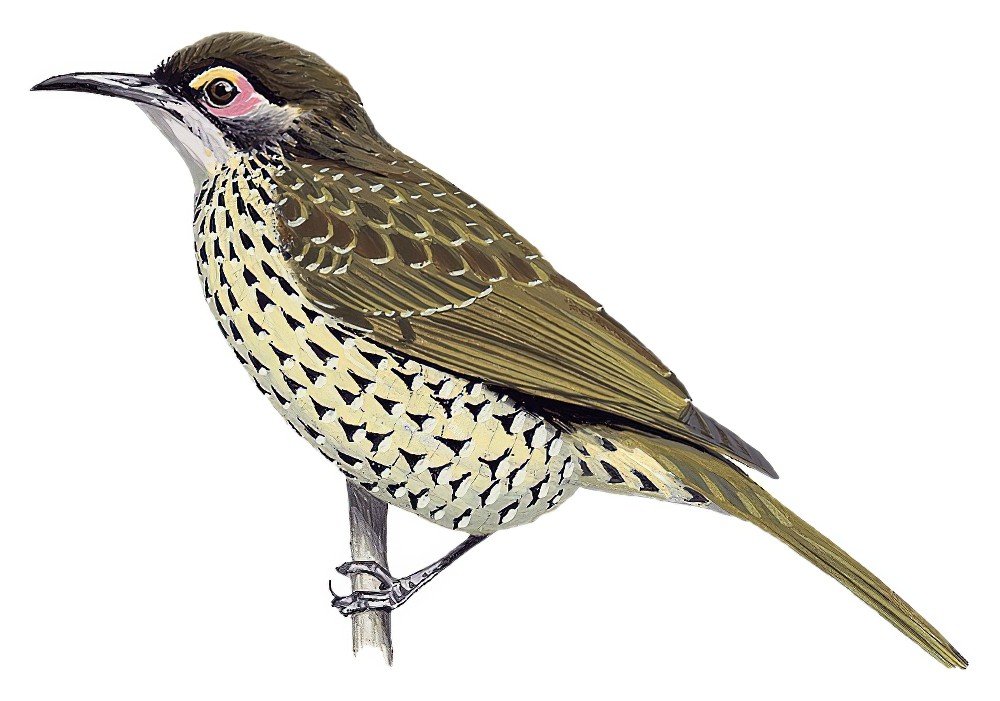Spotted Honeyeater / Xanthotis polygrammus

Spotted Honeyeater
SCI Name:
Protonym: Ptilotis polygramma Proc.Zool.Soc.London(1861) (1861), Pt3 p.429
Taxonomy: Passeriformes / Meliphagidae / Xanthotis
Taxonomy Code: spohon3
Type Locality: Waigeu Island.
Author: Gray, GR
Publish Year: 1862
IUCN Status: Least Concern
DEFINITIONS
XANTHOTIS
(Meliphagidae; Ϯ Tawny-breasted Honeyeater X. flaviventer) Gr. ξανθος xanthos yellow; -ωτις -ōtis -eared < ους ous, ωτος ōtos ear; "PHILÉDON A OREILLES JAUNES ... deux touffes d'un jaune d'or se dessinent de chaque côté sous les oreilles" (Lesson & Garnot 1828); "LXVIII. Xanthotis RCHB. Nat. Syst. der Vögel sppl. — Augenfeld nackt, am Ende desselben ein gelber Ohrbüschel. Hier wieder Repräsentant von Ptilotis. 304. X. flaviventris (Myzanthe — LESS. GARN.) RCHB — t. DIII. 3512. — Bräunlich olivengrün, Augenfeld unter den Ohren sich herabziehend nackt fleischroth, unter dem Auge ein blaßgelber Fleck, am Ende des Feldes ein befiederter hochgelber Querstreif ... In DUPERREY'S Reise pl. 21bis abgebildet als "Philédon à oreilles jaures [sic]", später von LESSON im Manuél II. 67. Myzantha flaviventris genannt, ohne Beschreibung. Wir sehen hier offenbar einen Philedon im Kleide einer Ptilotis, von dieser Gattung aber charakteristisch durch die vom Schnabelgrunde entfernten Nasenlöcher verschieden. — Neu-Guinea." (Reichenbach 1852); "Xanthotis Reichenbach, 1852, Handb. spec. Orn., abth. 2, Meropinae, continuatio no. IX, p. 139. Type, by monotypy, Xanthotis flaviventris Reichenbach = Myzantha flaviventer Lesson." (Salomonsen in Peters 1967, XII, 365).
Synon. Caloptilotis, Mundavis.
xanthotis
Gr. ξανθος xanthos yellow; -ωτις -ōtis -eared < ους ous, ωτος ōtos ear (cf. ξανθοτης xanthotēs yellowness).
polygramma / polygrammica / polygrammicum / polygrammus
Gr. πολυγραμμος polugrammos white-streaked (originally a white-streaked jasper), marked with many stripes < πολυς polus much; γραμμη grammē stroke, writing < γραφω graphō to write.
SUBSPECIES
Spotted Honeyeater (polygrammus)
SCI Name: Xanthotis polygrammus polygrammus
polygramma / polygrammica / polygrammicum / polygrammus
Gr. πολυγραμμος polugrammos white-streaked (originally a white-streaked jasper), marked with many stripes < πολυς polus much; γραμμη grammē stroke, writing < γραφω graphō to write.
Spotted Honeyeater (kuehni)
SCI Name: Xanthotis polygrammus kuehni
kuehni
Heinrich Kühn (1860-1906) German explorer, collector in the East Indies (syn. Aplonis minor, syn. Caprimulgus macrurus schlegelii, syn. Coracina novaehollandiae melanops, subsp. Cyornis hyacinthinus, subsp. Dicaeum celebicum, subsp. Dicrurus densus, syn. Eos rubra, subsp. Erythropitta macklotii, subsp. Gerygone dorsalis, subsp. Hypotaenidia torquata, Myzomela, subsp. Pachycephala griseonota, syn. Tyto alba delicatula, subsp. Xanthotis polygrammus, Zosterops) (see audacis).
Spotted Honeyeater (poikilosternos)
SCI Name: Xanthotis polygrammus poikilosternos
poikilosternos
Gr. ποικιλστερνος poikilosternos with spotted breast < ποικιλος poikilos spotted; στερνον sternon breat.
Spotted Honeyeater (septentrionalis)
SCI Name: Xanthotis polygrammus septentrionalis
septentrionale / septentrionales / septentrionalis / septentrionalium
L. septemtrionalis northern < septemtrio north.
● Erroneous TL "Northern parts of America" (= Tonga Tabu); ex “Northern Shrike” of Latham 1781 (syn. Clytorhynchus vitiensis).
Spotted Honeyeater (lophotis)
SCI Name: Xanthotis polygrammus lophotis
LOPHOTIS
(Otididae; Ϯ Red-crested Bustard L. ruficrista) Gr. λοφος lophos crest; ωτις ōtis, ωτιδος ōtidos bustard; the nuchal crest shown on the plates is only a feature of the displaying cock bird; "Lophotis R. ruficrista A. SM. [tab. CCLVI.] fig. 2175." (Reichenbach 1848); Reichenbach's plate shows the distinctive red nuchal crest. Reichenbach's 1849, plate XXXI, labelled Cursoriae: Tachydrominae .. Otidinae, shows a selection of bustards, including birds identified with the type of Lophotis.
Spotted Honeyeater (candidior)
SCI Name: Xanthotis polygrammus candidior
candidior
L. candidior, candidioris more white, whiter < comp. candidus dazzling white < candere to shine.
UPPERCASE: current genus
Uppercase first letter: generic synonym
● and ● See: generic homonyms
lowercase: species and subspecies
●: early names, variants, mispellings
‡: extinct
†: type species
Gr.: ancient Greek
L.: Latin
<: derived from
syn: synonym of
/: separates historical and modern geographic names
ex: based on
TL: type locality
OD: original diagnosis (genus) or original description (species)












